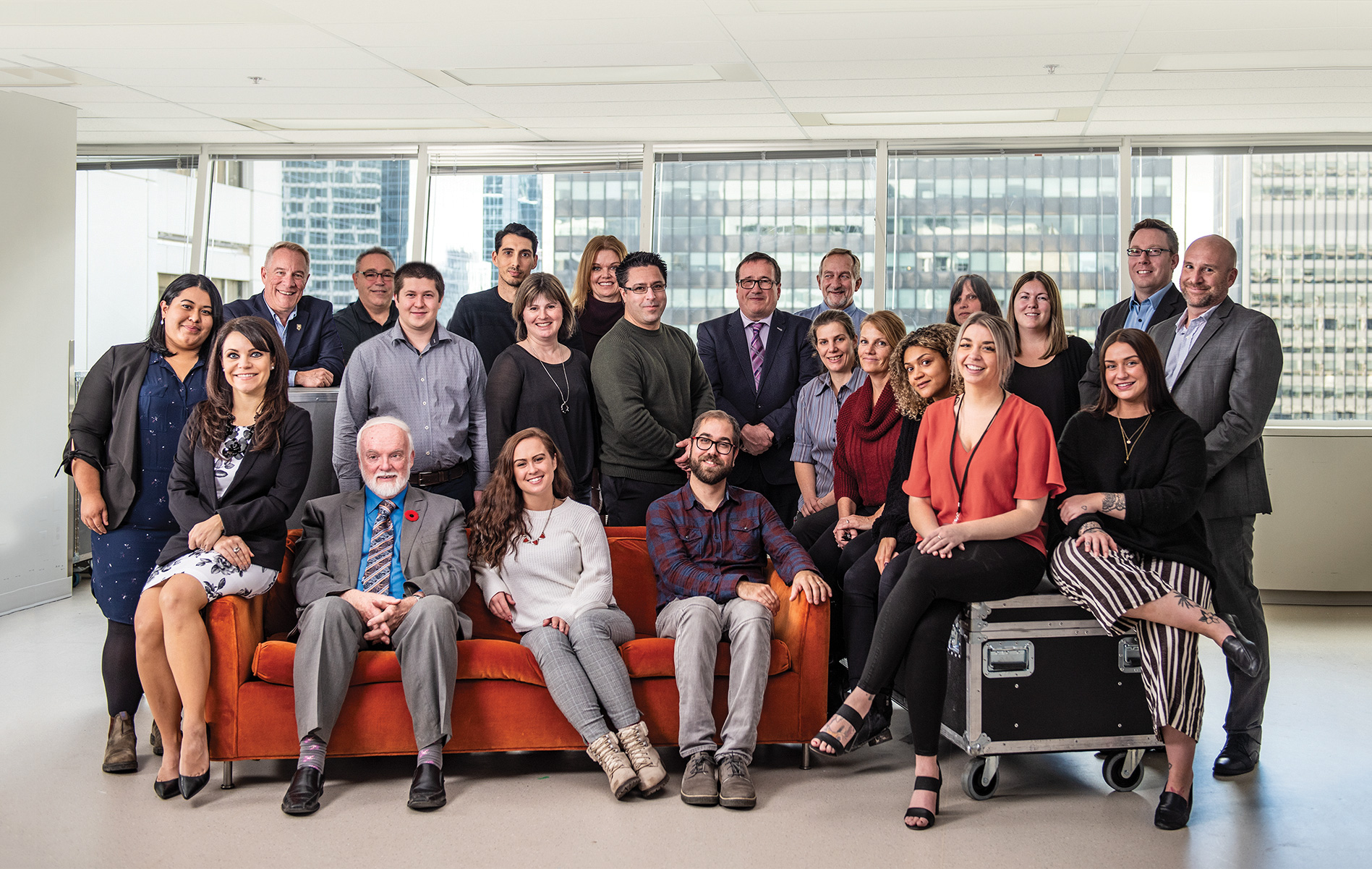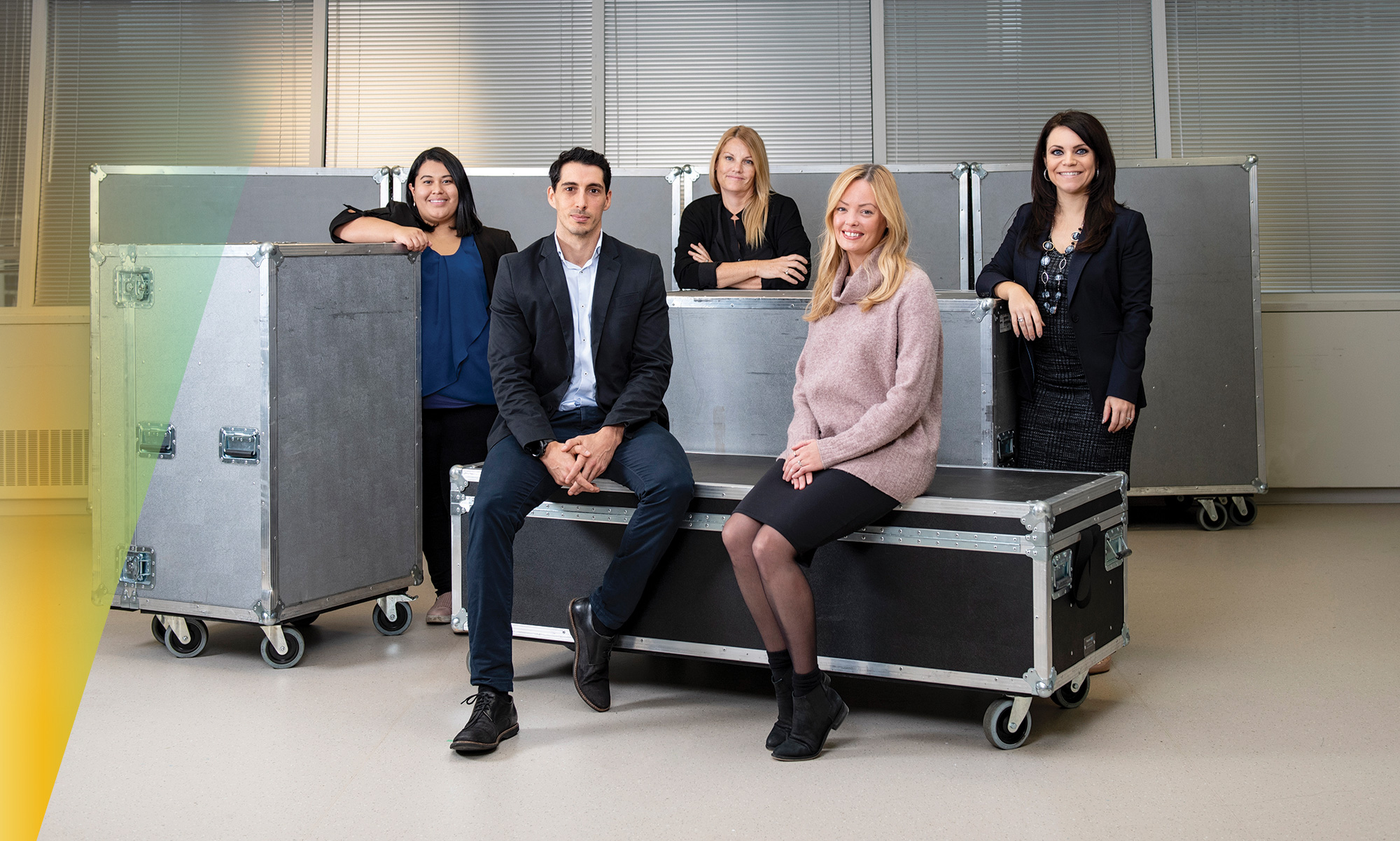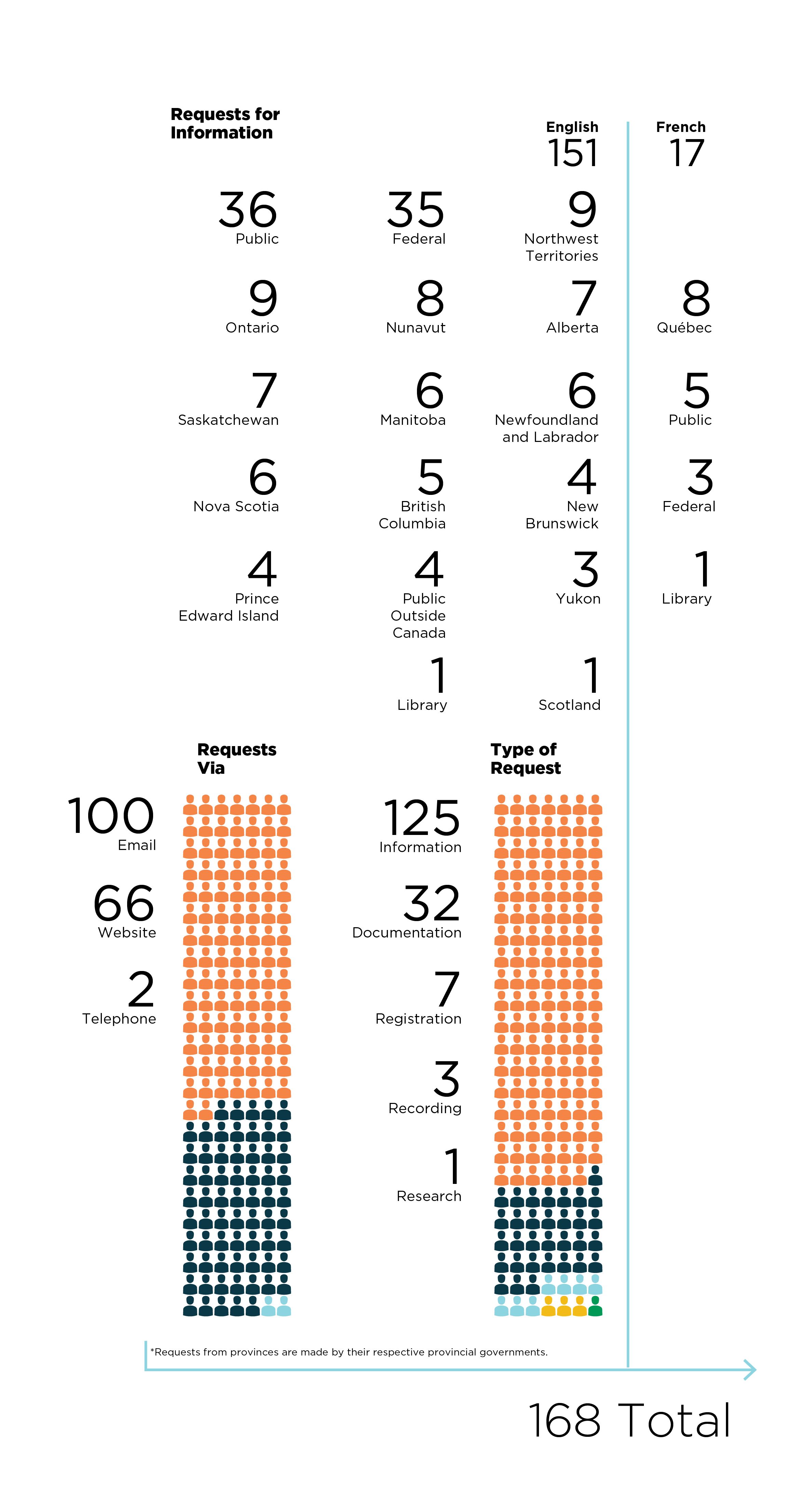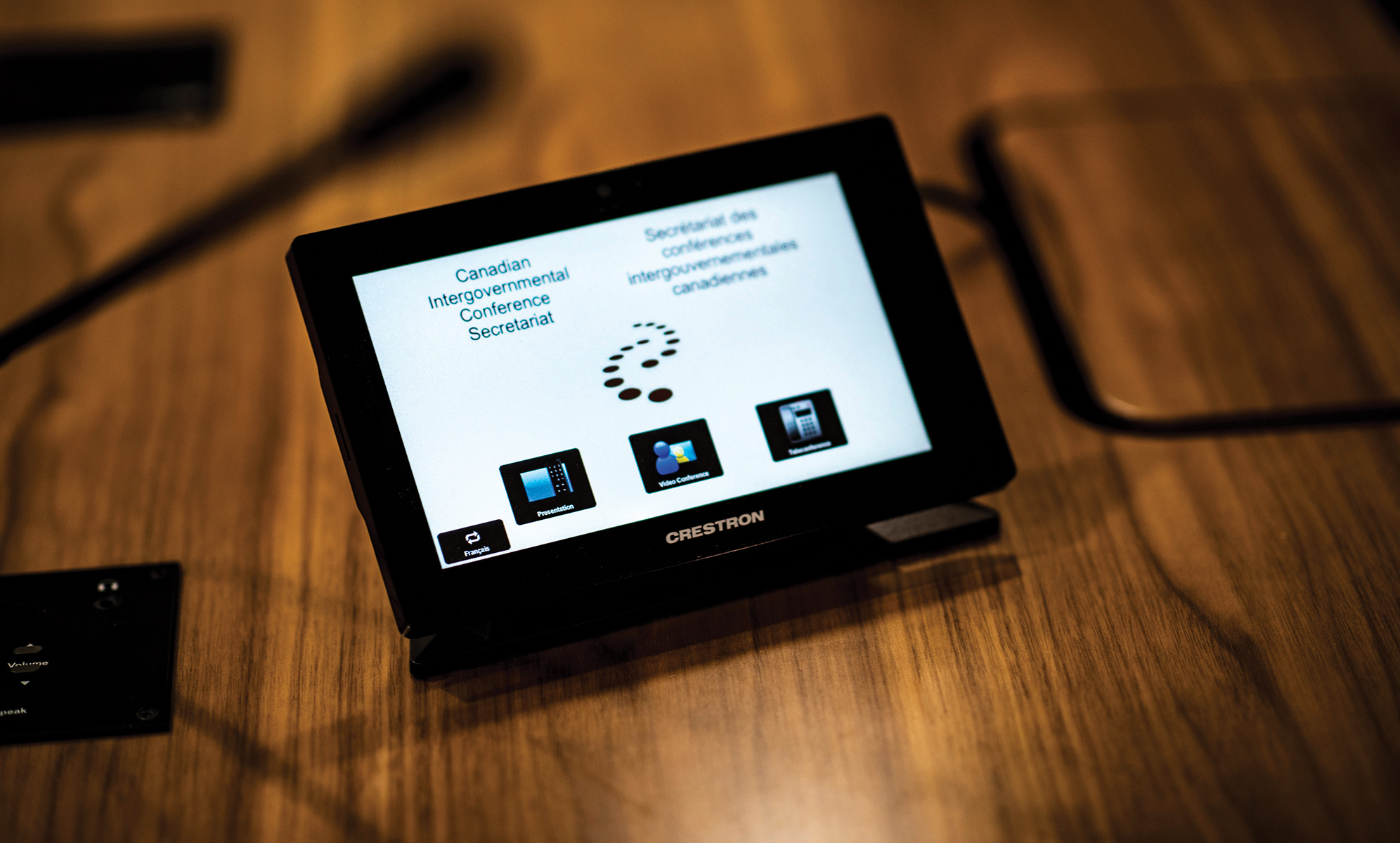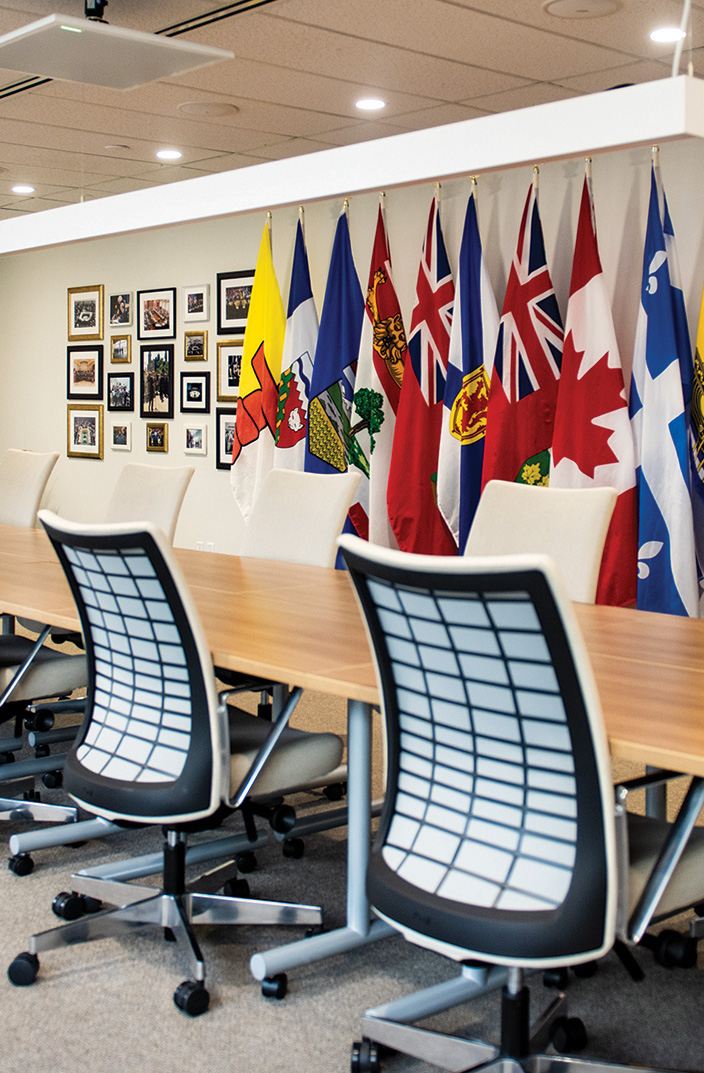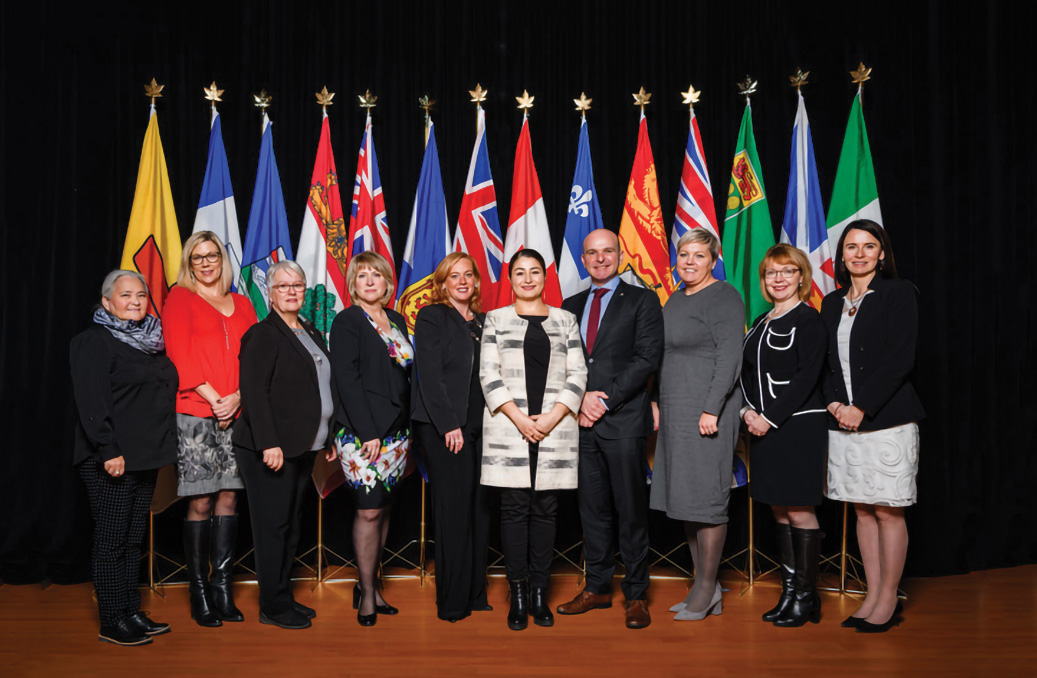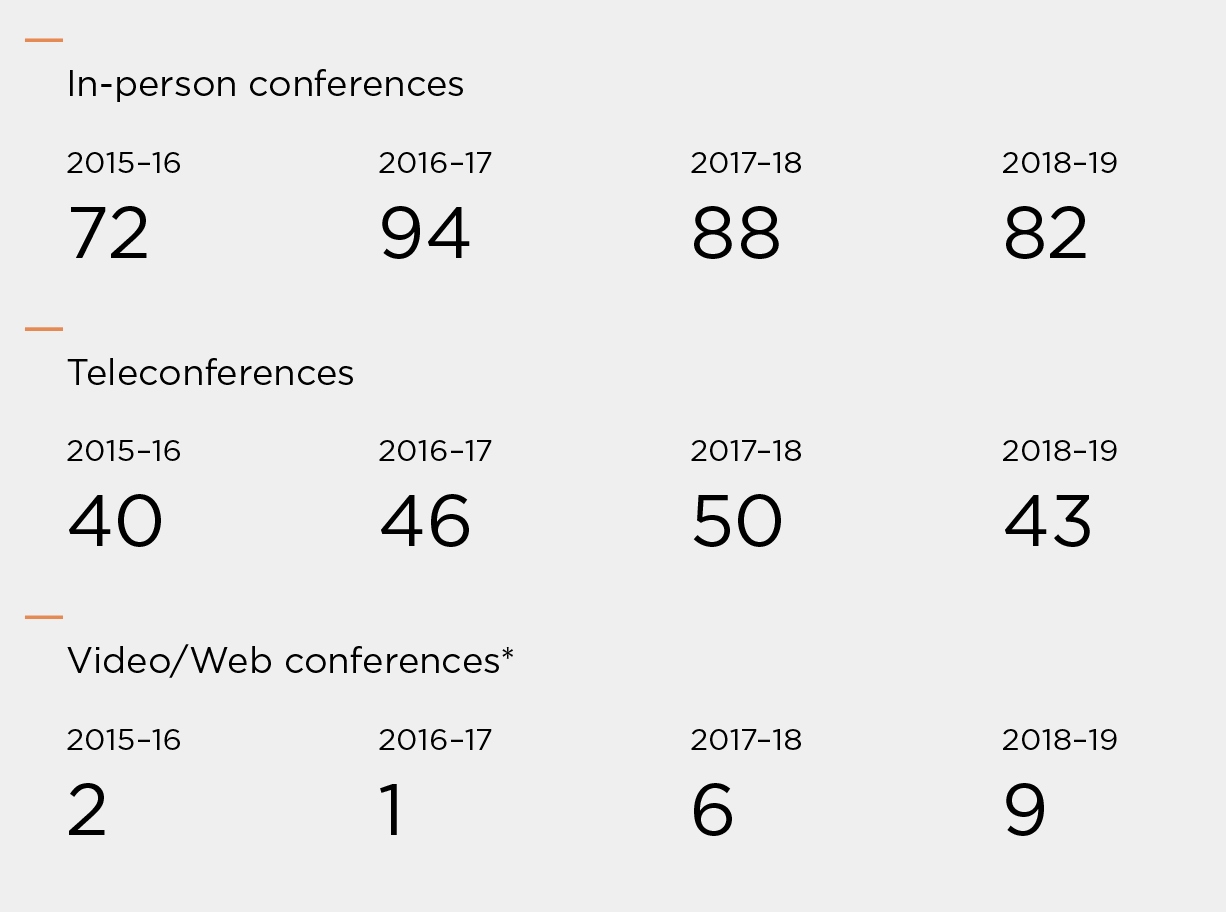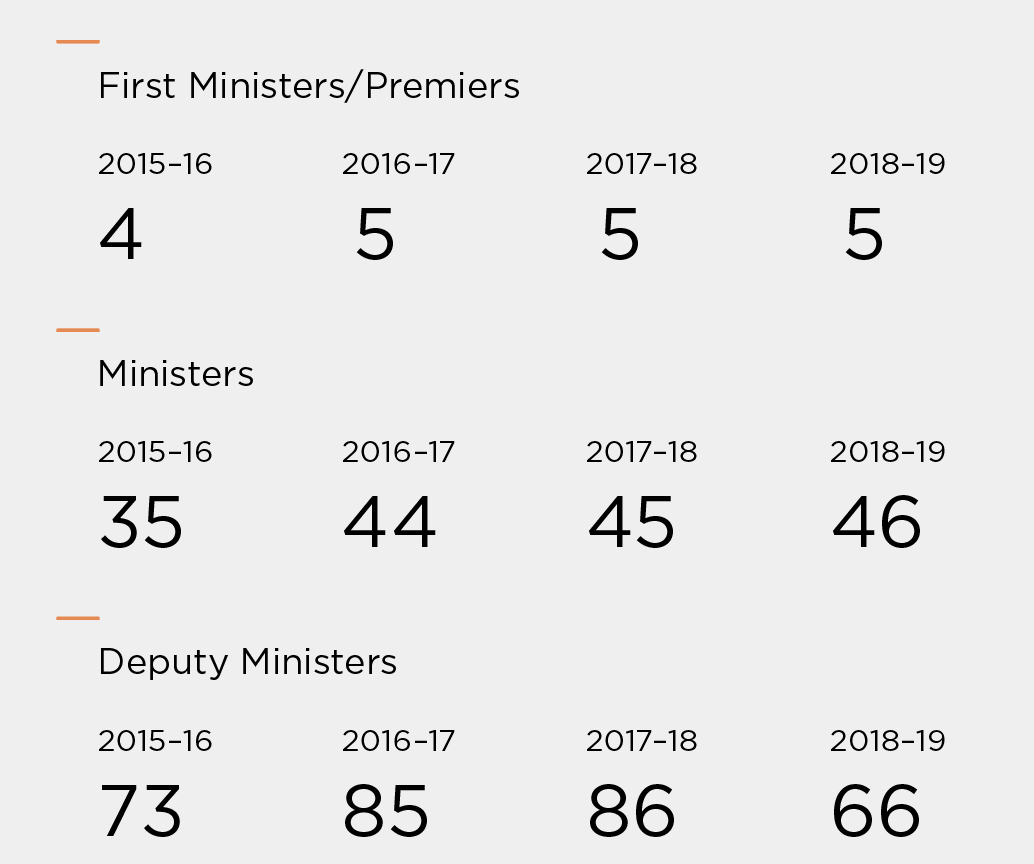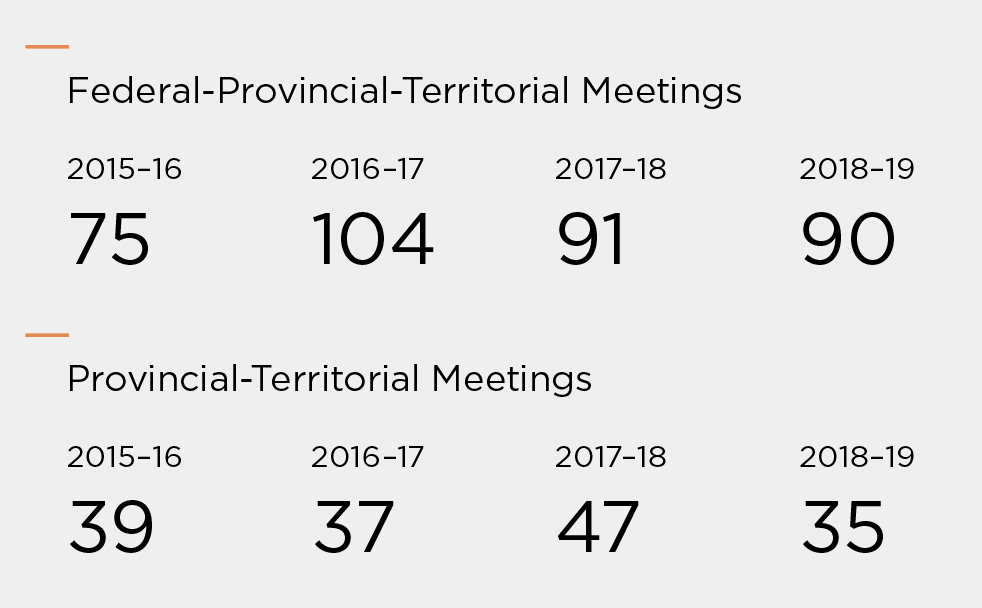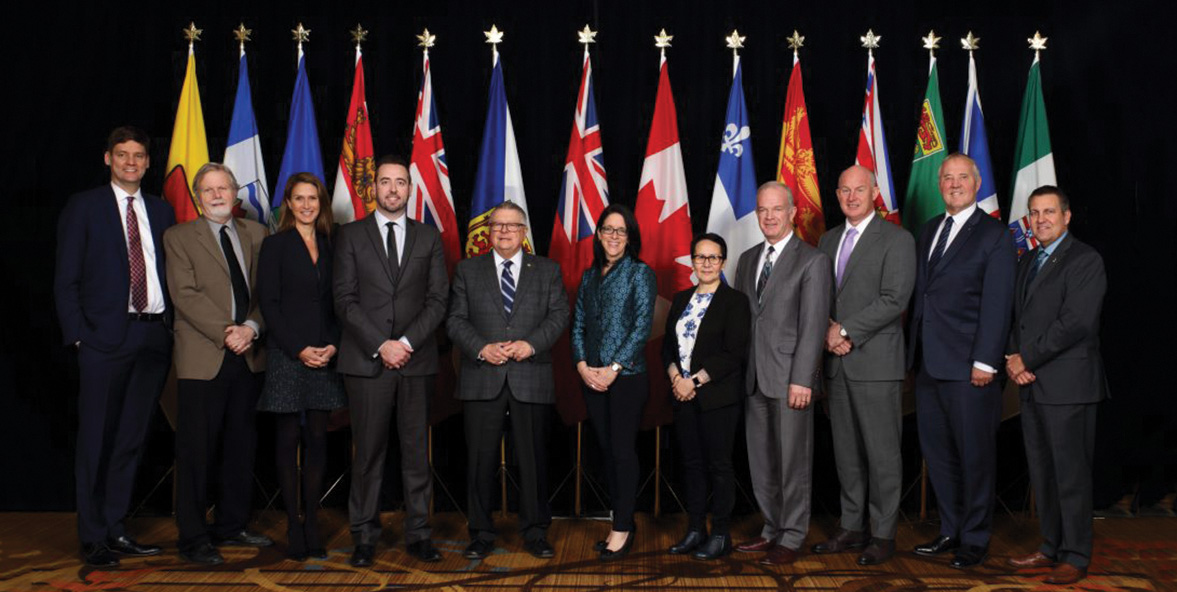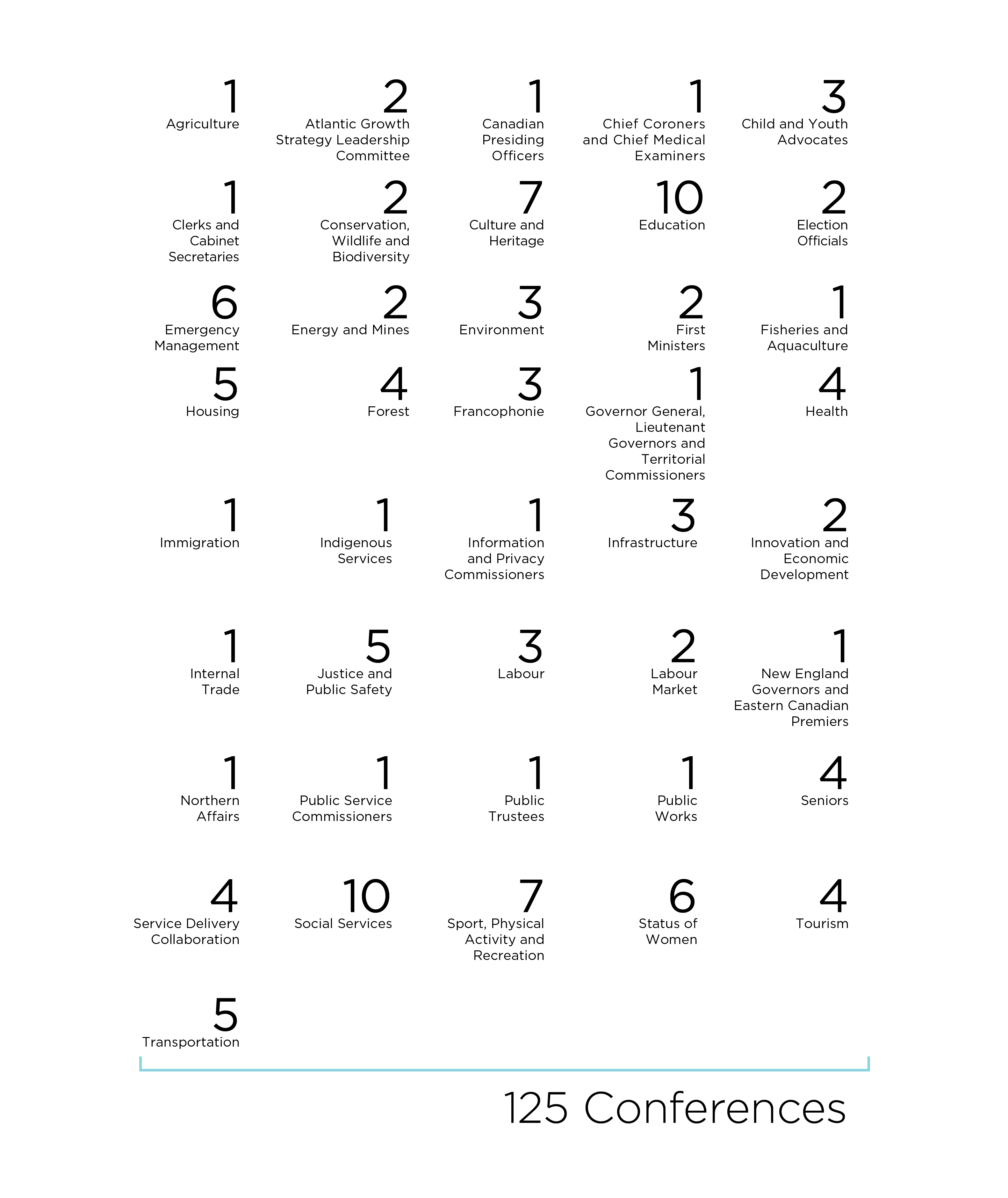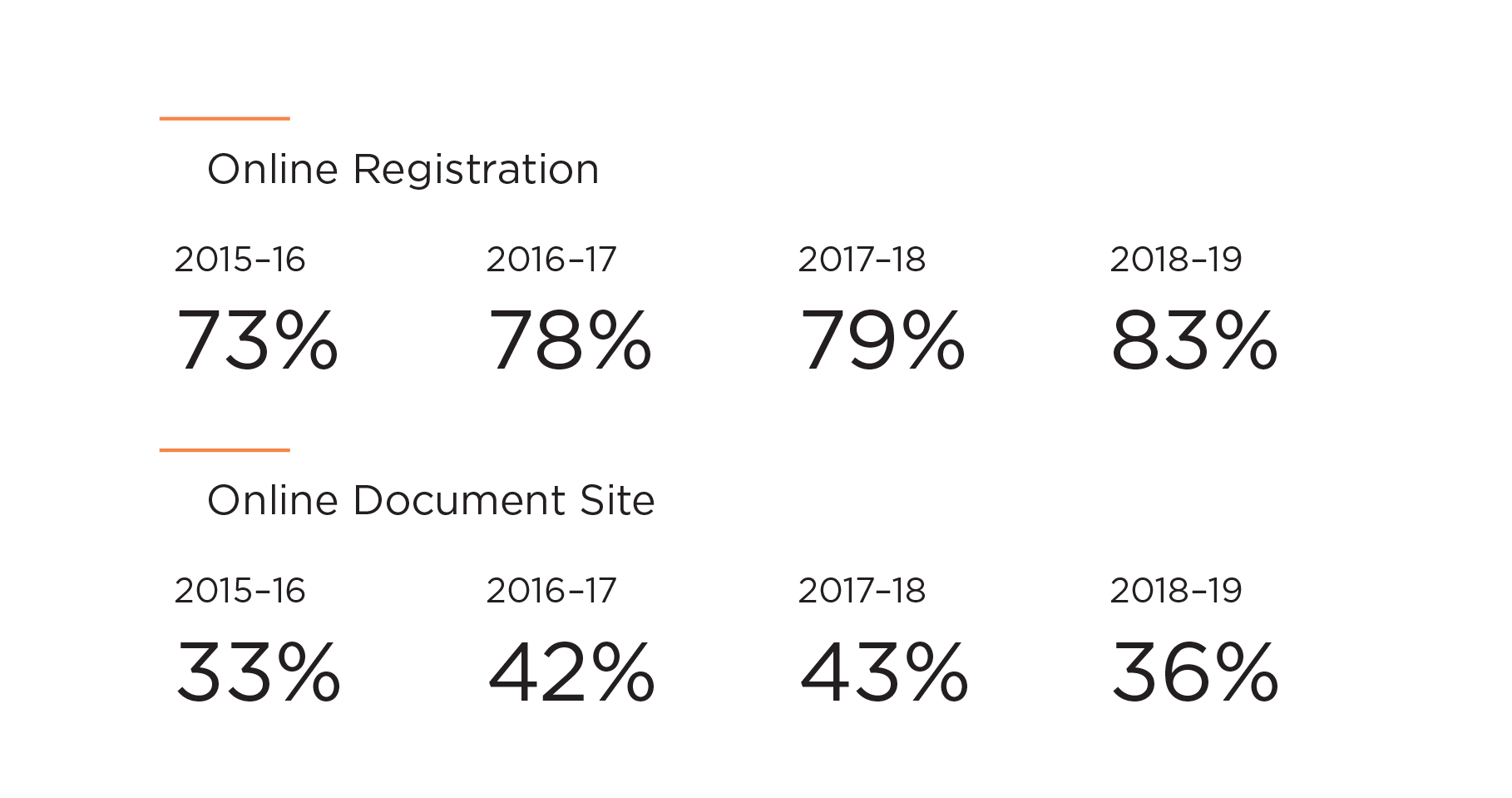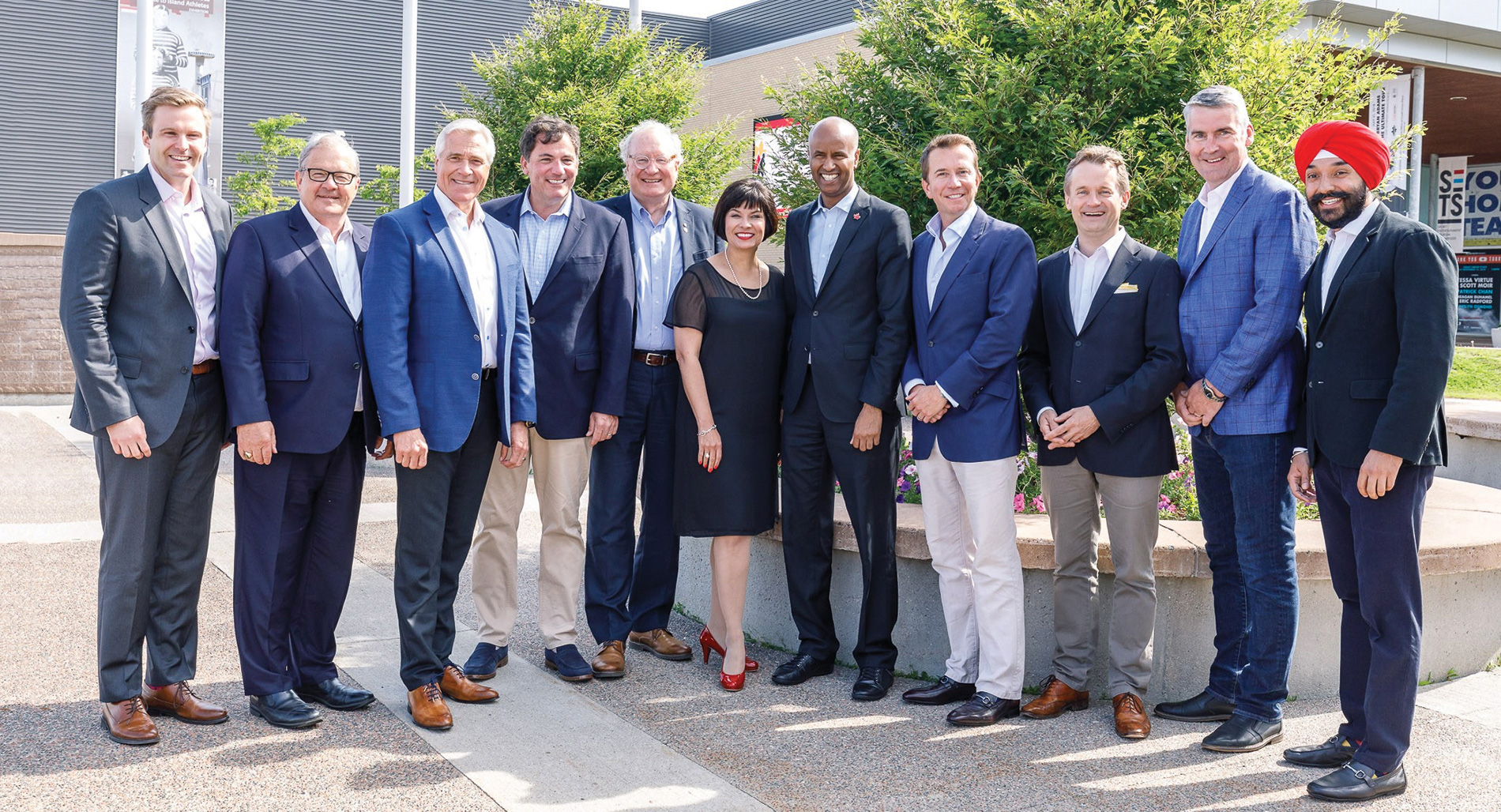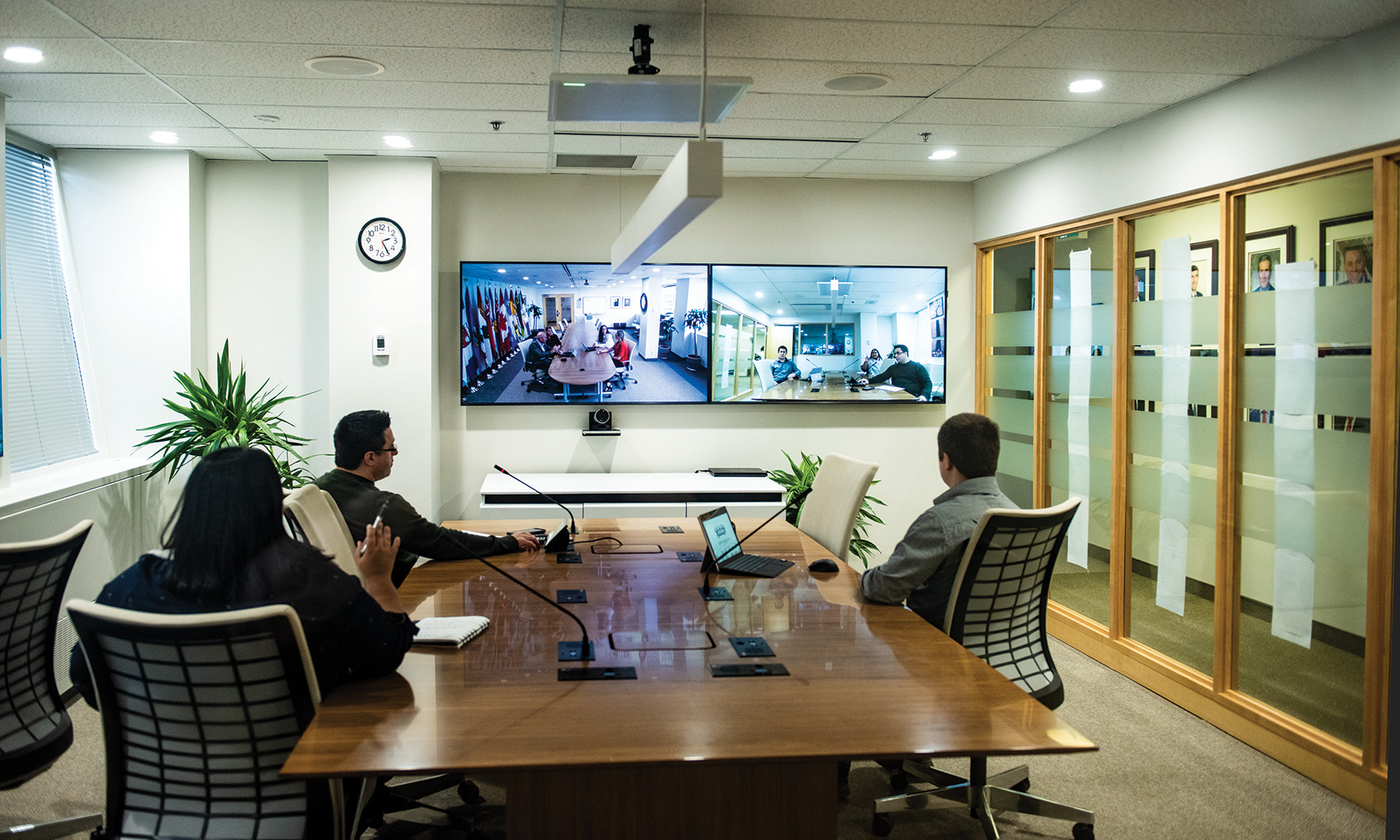| Environment |
Deputy Ministers |
FPT |
In-person |
Alberta |
October |
| Industry |
Deputy Ministers |
FPT |
In-person |
Alberta |
October |
| Industry |
Ministers |
FPT |
In-person |
Alberta |
October |
| Human Resources and Social Services |
Deputy Ministers |
PT |
In-person |
Alberta |
October |
| Sports and Recreation |
Ministers |
FPT |
In-person |
Alberta |
February |
| Sports and Recreation |
Deputy Ministers |
FPT |
In-person |
Alberta |
February |
| Emergency Preparedness |
Ministers |
FPT |
In-person |
Alberta |
January |
| Emergency Preparedness |
Ministers |
FPT |
In-person |
Alberta |
January |
| Agriculture |
Ministers |
FPT |
In-person |
British Columbia |
July |
| Education |
Deputy Ministers |
PT |
In-person |
British Columbia |
July |
| Education |
Ministers |
PT |
In-person |
British Columbia |
July |
| Human Resources and Social Services |
Deputy Ministers |
FPT |
In-person |
British Columbia |
May |
| Trade |
Ministers |
FPT |
In-person |
British Columbia |
October |
| Industry |
Ministers |
FPT |
In-person |
British Columbia |
October |
| Citizenship and Immigration |
Ministers |
FPT |
In-person |
Manitoba |
July |
| Health |
Ministers |
PT |
In-person |
Manitoba |
June |
| Health |
Ministers |
FPT |
In-person |
Manitoba |
June |
| Status of Women |
Senior Officials |
FPT |
In-person |
NCR |
April |
| Natural Resources |
Deputy Ministers |
FPT |
In-person |
NCR |
April |
| Transportation |
Senior Officials |
FPT |
In-person |
NCR |
April |
| Transportation |
Deputy Ministers |
FPT |
In-person |
NCR |
April |
| Human Resources and Social Services |
Deputy Ministers |
FPT |
In-person |
NCR |
February |
| Human Resources and Social Services |
Deputy Ministers |
PT |
In-person |
NCR |
February |
| Environment |
Ministers |
FPT |
In-person |
NCR |
June |
| Public Works and Government Administration |
Deputy Ministers |
FPT |
In-person |
NCR |
March |
| Natural Resources |
Deputy Ministers |
FPT |
In-person |
NCR |
May |
| Human Resources and Social Services |
Deputy Ministers |
FPT |
In-person |
NCR |
May |
| Emergency Preparedness |
Ministers |
FPT |
In-person |
NCR |
May |
| Emergency Preparedness |
Ministers |
FPT |
In-person |
NCR |
May |
| Sports and Recreation |
Ministers |
FPT |
In-person |
NCR |
November |
| Industry |
Deputy Ministers |
FPT |
In-person |
NCR |
September |
| Intergovernmental Affairs |
Deputy Ministers |
FPT |
In-person |
New Brunswick |
July |
| Heritage |
Vice-Regal |
FPT |
In-person |
New Brunswick |
June |
| Public Works and Government Administration |
Deputy Ministers |
PT |
In-person |
New Brunswick |
October |
| Public Works and Government Administration |
Deputy Ministers |
FPT |
In-person |
Newfoundland and Labrador |
July |
| Justice |
Ministers |
PT |
In-person |
Newfoundland and Labrador |
November |
| Justice |
Ministers |
FPT |
In-person |
Newfoundland and Labrador |
November |
| Fisheries |
Ministers |
FPT |
In-person |
Newfoundland and Labrador |
December |
| Intergovernmental Affairs |
Other |
FPT |
In-person |
Newfoundland and Labrador |
February |
| Human Resources and Social Services |
Ministers |
FPT |
In-person |
Newfoundland and Labrador |
January |
| Heritage |
Deputy Ministers |
FPT |
In-person |
Northwest Territories |
June |
| Heritage |
Ministers |
PT |
In-person |
Northwest Territories |
June |
| Heritage |
Ministers |
FPT |
In-person |
Northwest Territories |
June |
| Public Works and Government Administration |
Deputy Ministers |
FPT |
In-person |
Northwest Territories |
June |
| Justice |
Deputy Ministers |
PT |
In-person |
Northwest Territories |
June |
| Intergovernmental Affairs |
Ministers |
FPT |
In-person |
Northwest Territories |
January |
| Human Resources and Social Services |
Ministers |
PT |
In-person |
Nova Scotia |
July |
| Intergovernmental Affairs |
Premiers |
FPT |
In-person |
Nova Scotia |
March |
| Industry |
Deputy Ministers |
FPT |
In-person |
Nova Scotia |
May |
| Justice |
Deputy Ministers |
PT |
In-person |
Nova Scotia |
October |
| Public Works and Government Administration |
Deputy Ministers |
FPT |
In-person |
Nova Scotia |
September |
| Local Government |
Deputy Ministers |
FPT |
In-person |
Nova Scotia |
September |
| Local Government |
Ministers |
FPT |
In-person |
Nova Scotia |
September |
| Natural Resources |
Ministers |
FPT |
In-person |
Nova Scotia |
September |
| Public Works and Government Administration |
Deputy Ministers |
PT |
In-person |
Nunavut |
June |
| Natural Resources |
Ministers |
FPT |
In-person |
Nunavut |
August |
| Health |
Deputy Ministers |
PT |
In-person |
Ontario |
April |
| Health |
Deputy Ministers |
FPT |
In-person |
Ontario |
April |
| Housing |
Ministers |
FPT |
In-person |
Ontario |
April |
| Housing |
Ministers |
PT |
In-person |
Ontario |
April |
| Environment |
Deputy Ministers |
FPT |
In-person |
Ontario |
March |
| Environment |
Deputy Ministers |
FPT |
In-person |
Ontario |
December |
| Education |
Deputy Ministers |
PT |
In-person |
Ontario |
December |
| Education |
Deputy Ministers |
PT |
In-person |
Ontario |
December |
| Education |
Deputy Ministers |
PT |
In-person |
Ontario |
December |
| Justice |
Deputy Ministers |
FPT |
In-person |
Ontario |
February |
| Public Works and Government Administration |
Deputy Ministers |
PT |
In-person |
Ontario |
January |
| Intergovernmental Affairs |
Premiers |
FPT |
In-person |
Prince Edward Island |
July |
| Health |
Deputy Ministers |
FPT |
In-person |
Quebec |
October |
| Intergovernmental Affairs |
First Ministers |
FPT |
In-person |
Quebec |
December |
| Intergovernmental Affairs |
First Ministers |
FPT |
Teleconference |
Quebec |
December |
| Transportation |
Ministers |
FPT |
In-person |
Quebec |
January |
| Justice |
Deputy Ministers |
PT |
In-person |
Saskatchewan |
June |
| Justice |
Deputy Ministers |
FPT |
In-person |
Saskatchewan |
June |
| Transportation |
Senior Officials |
FPT |
In-person |
Saskatchewan |
October |
| Transportation |
Deputy Ministers |
FPT |
In-person |
Saskatchewan |
October |
| Public Works and Government Administration |
Deputy Ministers |
FPT |
In-person |
Saskatchewan |
September |
| Intergovernmental Affairs |
Premiers |
PT |
In-person |
Vermont |
August |
| Emergency Preparedness |
Deputy Ministers |
FPT |
Teleconference |
Virtual |
April |
| Human Resources and Social Services |
Ministers |
PT |
Teleconference |
Virtual |
April |
| Human Resources and Social Services |
Ministers |
FPT |
Teleconference |
Virtual |
April |
| Sports and Recreation |
Deputy Ministers |
FPT |
Teleconference |
Virtual |
April |
| Heritage |
Deputy Ministers |
FPT |
Teleconference |
Virtual |
April |
| Education |
Deputy Ministers |
PT |
Teleconference |
Virtual |
April |
| Natural Resources |
Deputy Ministers |
FPT |
Teleconference |
Virtual |
August |
| Status of Women |
Senior Officials |
FPT |
Teleconference |
Virtual |
August |
| Housing |
Ministers |
PT |
Teleconference |
Virtual |
December |
| Human Resources and Social Services |
Deputy Ministers |
FPT |
Teleconference |
Virtual |
December |
| Education |
Deputy Ministers |
PT |
Teleconference |
Virtual |
February |
| Local Government |
Ministers |
FPT |
Teleconference |
Virtual |
February |
| Heritage |
Deputy Ministers |
PT |
Teleconference |
Virtual |
February |
| Heritage |
Deputy Ministers |
FPT |
Teleconference |
Virtual |
February |
| Human Resources and Social Services |
Ministers |
PT |
Teleconference |
Virtual |
February |
| Human Resources and Social Services |
Ministers |
PT |
Teleconference |
Virtual |
February |
| Natural Resources |
Ministers |
FPT |
Teleconference |
Virtual |
February |
| Human Resources and Social Services |
Senior Officials |
PT |
Teleconference |
Virtual |
January |
| Human Resources and Social Services |
Senior Officials |
FPT |
Teleconference |
Virtual |
January |
| Sports and Recreation |
Deputy Ministers |
FPT |
Teleconference |
Virtual |
January |
| Human Resources and Social Services |
Deputy Ministers |
PT |
Teleconference |
Virtual |
January |
| Human Resources and Social Services |
Deputy Ministers |
FPT |
Teleconference |
Virtual |
January |
| Status of Women |
Ministers |
FPT |
Teleconference |
Virtual |
July |
| Education |
Deputy Ministers |
PT |
Teleconference |
Virtual |
June |
| Human Resources and Social Services |
Deputy Ministers |
PT |
Teleconference |
Virtual |
June |
| Human Resources and Social Services |
Deputy Ministers |
FPT |
Teleconference |
Virtual |
June |
| Human Resources and Social Services |
Deputy Ministers |
FPT |
Teleconference |
Virtual |
March |
| Industry |
Deputy Ministers |
FPT |
Teleconference |
Virtual |
March |
| Heritage |
Ministers |
PT |
Teleconference |
Virtual |
May |
| Human Resources and Social Services |
Deputy Ministers |
PT |
Teleconference |
Virtual |
May |
| Status of Women |
Deputy Ministers |
FPT |
Teleconference |
Virtual |
May |
| Sports and Recreation |
Ministers |
FPT |
Teleconference |
Virtual |
May |
| Human Resources and Social Services |
Ministers |
FPT |
Teleconference |
Virtual |
November |
| Indigenous Services |
Ministers |
FPT |
Teleconference |
Virtual |
November |
| Sports and Recreation |
Deputy Ministers |
FPT |
Teleconference |
Virtual |
November |
| Environment |
Ministers |
FPT |
Teleconference |
Virtual |
November |
| Education |
Deputy Ministers |
PT |
Teleconference |
Virtual |
November |
| Human Resources and Social Services |
Deputy Ministers |
FPT |
Teleconference |
Virtual |
November |
| Heritage |
Deputy Ministers |
FPT |
Teleconference |
Virtual |
November |
| Human Resources and Social Services |
Deputy Ministers |
FPT |
Teleconference |
Virtual |
October |
| Human Resources and Social Services |
Deputy Ministers |
FPT |
In-person |
Virtual |
October |
| Industry |
Deputy Ministers |
FPT |
Teleconference |
Virtual |
September |
| Education |
Deputy Ministers |
PT |
Teleconference |
Virtual |
September |
| Heritage |
Ministers |
PT |
In-person |
Yukon |
July |
| Heritage |
Ministers |
FPT |
In-person |
Yukon |
July |
| Status of Women |
Ministers |
FPT |
In-person |
Yukon |
October |
| Status of Women |
Ministers |
FPT |
In-person |
Yukon |
October |







